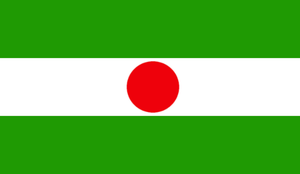Ta'ang National Liberation Army
The Ta'ang National Liberation Army (Burmese: တအောင်း အမျိုးသား လွတ်မြောက်ရေး တပ်မတော်; abbreviated TNLA) is an insurgent group in Myanmar (Burma), and the armed wing of the Palaung State Liberation Front (PSLF). The TNLA is known for its opium poppy cultivation of poppy fields, heroin refineries and meth labs.[3][7]
| Ta'ang National Liberation Army | |
|---|---|
တအောင်း အမျိုးသား လွတ်မြောက်ရေး တပ်မတော် Participant in the internal conflict in Myanmar | |
 Flag of the Ta'ang National Liberation Army | |
| Active | January 1992 – present |
| Ideology | Ta'ang nationalism Federalism[1] |
| Leaders | Tar Aik Bong Tar Bone Kyaw Tar Hod Plarng |
| Headquarters | Namhsan, Myanmar |
| Area of operations | Tawngpeng, Shan State |
| Size | 1,500[2]–3,500[3] 5,000 (TNLA claim)[1] |
| Part of | Palaung State Liberation Front |
| Allies | Northern Alliance[4]
Other allies |
| Opponent(s) | State opponents
Non-state opponents
|
| Battles and war(s) | Internal conflict in Myanmar |
| Website | pslftnla |
Opium smugglers that are caught by the TNLA are arrested, and the TNLA claim that narcotics seized are hidden in the jungle to be publicly burned on special occasions to deter drug smuggling.[6] The TNLA have engaged government forces numerous times during their operations against opium production, as their main objective is to achieve self-determination for the Ta'ang (Palaung) people.[8]
History
The TNLA was originally founded as the Palaung State Liberation Organization/Army (PSLO/A), which signed a ceasefire agreement with the government in 1991 and disarmed in 2005. After the dissolution of the PSLO/A, Ta'ang (Palaung) leaders Tar Aik Bong and Tar Bone Kyaw founded the TNLA alongside the PSLF to continue fighting for the self-determination of the Ta'ang people. The TNLA is presently allied with the Kachin Independence Army and the Shan State Army - South, and have been conducting operations alongside them in northern Shan State.[2]
Following the 2010 general election and constitutional reforms in 2011, the government created the Pa Laung Self-Administered Zone in northern Shan State as a special self-administration zone for the Ta'ang people. The region is one of the most underdeveloped in the country, with few schools and hospitals.
References
- Hay, Wayne (17 February 2016). "Myanmar rebels continue fight despite ceasefire deal". www.aljazeera.com. Retrieved 18 December 2016.
- "Myanmar Peace Monitor - TNLA".
- Larsen, Niels (23 April 2015). "On Patrol With Myanmar Rebels Fighting Both the Army and Drug Addiction". VICE News (Crime and Drugs).
- Lynn, Kyaw Ye. "Curfew imposed after clashes near Myanmar-China border". Anadolu Agency. Retrieved 21 November 2016.
- Finney, Richard; Mar (translator), Khet (2 August 2018). "300 Myanmar Villagers Flee Township as Ethnic Armies Approach". Radio Free Asia. Retrieved 3 August 2018.
- Veits, Chris (July 2015). "Are the TNLA a threat to peace in Myanmar? - Inside the TNLA's war on drugs". Journeyman Pictures.
- "Fire and Ice: Conflict and Drugs in Myanmar's Shan State". Crisis Group. 8 January 2019. Retrieved 4 January 2020.
- Haquet, Charles; Bolzinger, Bertrand (2014). "Burma: Rubies and Religion - Java Films". Dreamway Productions. Java Films.